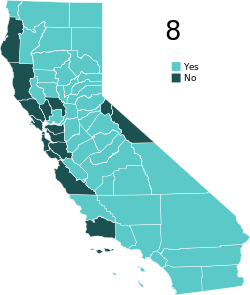The media often creates confusion in a citizen’s decision to vote for or against certain propositions. The signs posted in street corners, sidewalks and front yards that boldly proclaim red, white, and blue statements such as “Yes on Proposition 35” or “No on Proposition 37” are so common and uninformative that we rarely take notice of them, and when we do, it is just the slogan that sticks with us – not the message. Various pro or anti proposition organizations also produce many TV commercials that tend to be very directly geared toward our pathos and not so much toward the truth. Many voters don’t know enough to make an informed decision without proper background. Below are the eleven propositions on the ballot for November with the information necessary to make a proper decision. Most of these descriptions include a summary word for word straight from the official voter’s information guide, pros, cons, and information that was not mentioned in the voter’s guide.
Proposition 30
Summary: Increases taxes on earnings over $250,000 for seven years and sales taxes by ¼ cent for four years, to fund schools. Guarantees public safety realignment funding. Fiscal Impact: Increased state tax revenues through 2018–19, averaging about $6 billion annually over the next few years. Revenues available for funding state budget. In 2012–13, planned spending reductions, primarily to education programs, would not occur.
Pros:
Asks the wealthiest to temporarily pay more to prevent more school funding cuts
Provides billions in new education funding
Guarantees local public safety
Helps balance state budgetCons:
$50 billion on sales and income taxes
No guarantee of additional money for schools
Unknown where exactly the money goesUnmentioned:
Taxes on earnings increases from 7.5% from 7.25%
Merger between the “Millionaire’s tax” and Gov. Jerry Brown’s First Tax Increase Proposal
If prop is passed in November 2012, income tax will apply retroactively to all income earned or received since January 1st
89% of temporary tax revenues to K-12 schools, 11% to community colleges
Proposition 31
Summary: Establishes two-year state budget. Sets rules for offsetting new expenditures, and Governor budget cuts in fiscal emergencies. Local governments can alter application of laws governing state-funded programs. Fiscal Impact: Decreased state sales tax revenues of $200 million annually, with corresponding increases of funding to local governments. Other, potentially more significant changes in state and local budgets, depending on future decisions by public officials.
Pros:Stops politicians from “keeping Californians in the dark” about how their government is functioning
prevents state from passing budgets behind closed doors
stops politicians from creating programs with money the state doesn’t have
requires governments to report results before spending more moneyCons:
locks expensive and conflicting provisions into the Constitution, causing lawsuits, confusion, and cost
threatens public health and the environment
prevents future increases in funding for schools
blocks tax cutsUnmentioned:
every bill must be in print at least three days before lawmakers can vote on it
allows the Governor to reduce spending if the Legislature fails to take any action during a fiscal emergency
Proposition 32
Summary: Prohibits unions from using payroll-deducted funds for political purposes. Applies same use prohibition to payroll deductions, if any, by corporations or government contractors. Prohibits union and corporate contributions to candidates and their committees. Prohibits government contractor contributions to elected officers or their committees. Fiscal Impact: Increased costs to state and local government, potentially exceeding $1 million annually, to implement and enforce the measure’s requirements.
Pros:
Bans contributions from corporations and unions to politicians
Prohibits contributions from government contractors
Stops payroll withholding for politics, making all contributions voluntaryCons:
exempts business Super PACs and thousands of big businesses from its provisions
applies restrictions on working people and their unionsUnmentioned:
Business Super PACs and independent expenditure committees are EXEMPT from Prop. 32
Proposition 33
Summary: Changes current law to allow insurance companies to set prices based on whether the driver previously carried auto insurance with any insurance company. Allows proportional discount for drivers with some prior coverage. Allows increased cost for drivers without history of continuous coverage. Fiscal Impact: Probably no significant fiscal effect on state insurance premium tax revenues.
Pros:
allows Californians the freedom to change insurance companies and keep discount
makes insurance companies compete, helps lower rates, and insures more driversCons:
allows auto insurers to raise premiums on responsible drivers up to $1,000, unfairly punishing people who stopped driving for legitimate reasons
Unmentioned:
treats drivers with lapse as continuously covered if lapse is due to military service or loss of employment, or if lapse is less than 90 days
Proposition 34
Summary: Repeals death penalty and replaces it with life imprisonment without possibility of parole. Applies retroactively to existing death sentences. Directs $100 million to law enforcement agencies for investigations of homicide and rape cases. Fiscal Impact: Ongoing state and county criminal justice savings of about $130 million annually within a few years, which could vary by tens of millions of dollars. One-time state costs of $100 million for local law enforcement grants.
Pros:
prevents any possibility of executing an innocent person
makes killers work and pay court-ordered restitution to victims
saves wasted tax dollars and directs $100 million to law enforcement to solve rapes and murdersCons:
costs taxpayers $100 million over four years and many millions more, long term
taxpayers would pay at least $50,000 annually to pay for lifetime healthcare/housing to killersUnmentioned:
when California’s death penalty was eliminated before, condemned criminals were released only to commit crimes again; voters chose to restore capital punishment
death penalty is given to less than 2% of murderers whose juries unanimously delivered the sentence
Proposition 35
Summaries: Increases prison sentences and fines for human trafficking convictions. Requires convicted human traffickers to register as sex offenders. Requires registered sex offenders to disclose Internet activities and identities. Fiscal Impact: Costs of a few million dollars annually to state and local governments for addressing human trafficking offenses. Potential increased annual fine revenue of a similar amount, dedicated primarily for human trafficking victims.
Pros:
makes tougher sentencing for traffickers, help for victims, protections for children online
makes convicted traffickers register as sex offenders, and requires all registered sex offenders to provide information to the authorities about their Internet presence, in order to help prevent human trafficking onlineCons:
anyone receiving financial support from normal, consensual prostitution among adults—including a sex worker’s children, parents, spouse, domestic partner, roommate, landlord, or others—could be prosecuted as a human trafficker, and if convicted, forced to register as a sex offender for life
Proposition 37
Summary: Requires labeling of food sold to consumers made from plants or animals with genetic material changed in specified ways. Prohibits marketing such food, or other processed food, as “natural.” Provides exemptions. Fiscal Impact: Increased annual state costs from a few hundred thousand dollars to over $1 million to regulate the labeling of genetically engineered foods. Additional, but likely not significant, governmental costs to address violations under the measure.
Pros:
gives us the right to know what is in the food we eat
requires labeling of food produced using genetic engineering, so we can choose whether to buy those products or notCons:
filled with special-interest exemptions and loopholes
would create new government bureaucracy costing taxpayers millions, authorize expensive shakedown lawsuits against farmers and small businesses, and increase family grocery bills by hundreds of dollars per yearUnmentioned:
exempts milk, cheese and meat from its labeling requirements
exempts beer, wine, liquor, food sold at restaurants and other foods containing genetically engineered (GE) ingredients
written by a trial lawyer to create a new category of shakedown lawsuits allowing lawyers to sue farmers, grocers, and food companies—without any proof of violation or damage
No government bureaucracy, politician or agrichemical company will be able to hide whether your food is genetically engineered
[fb-share]
[tweetbutton]
































